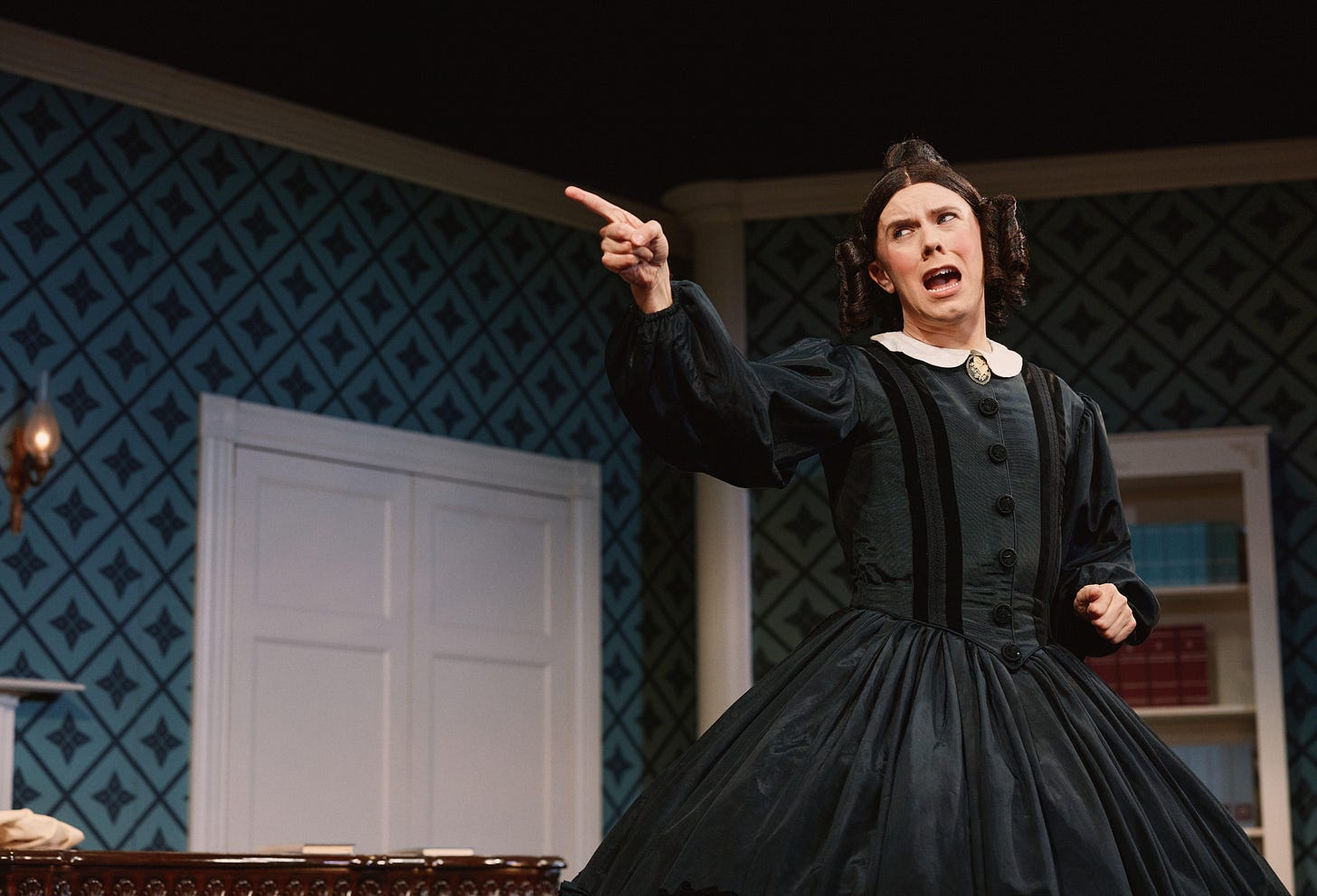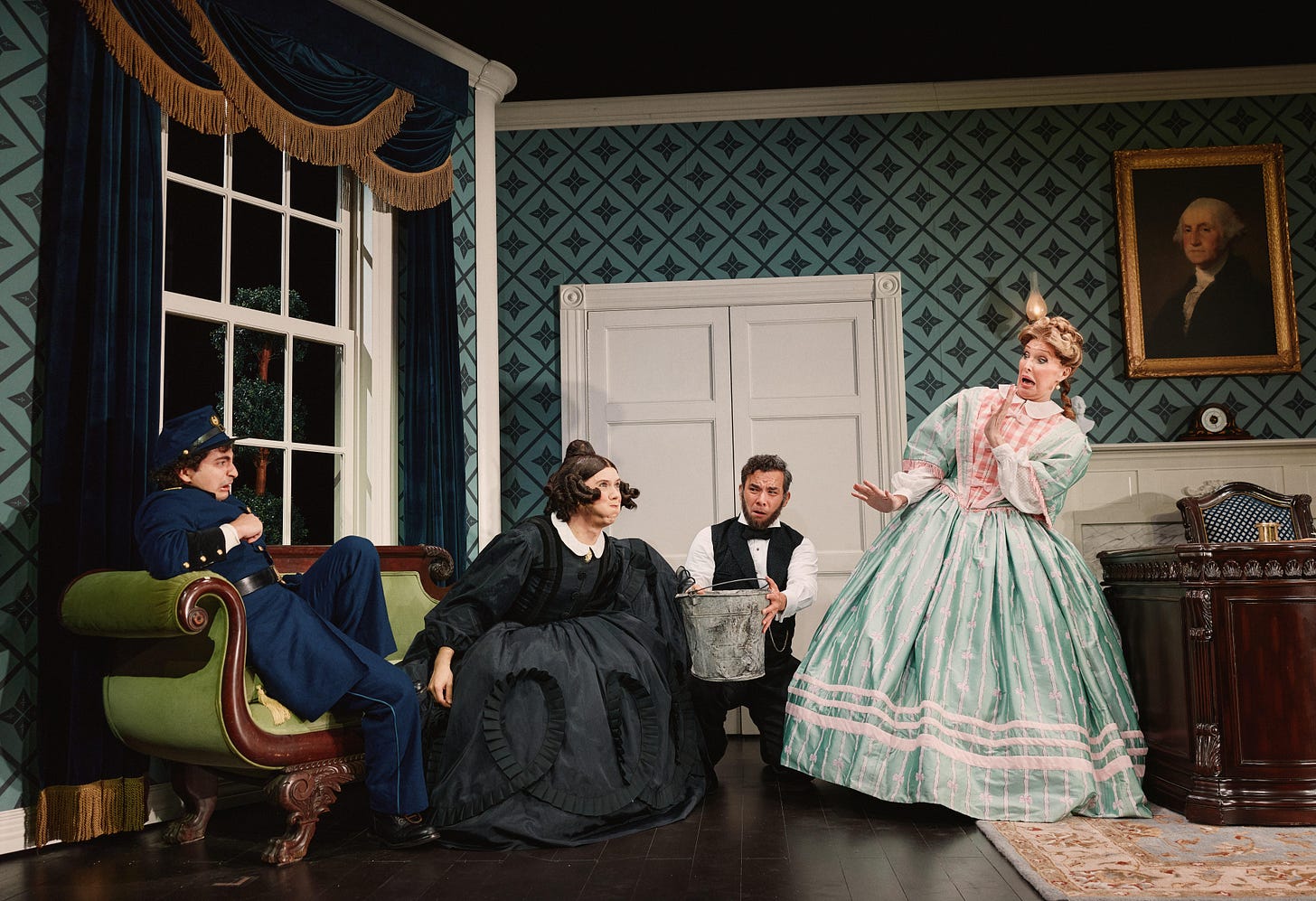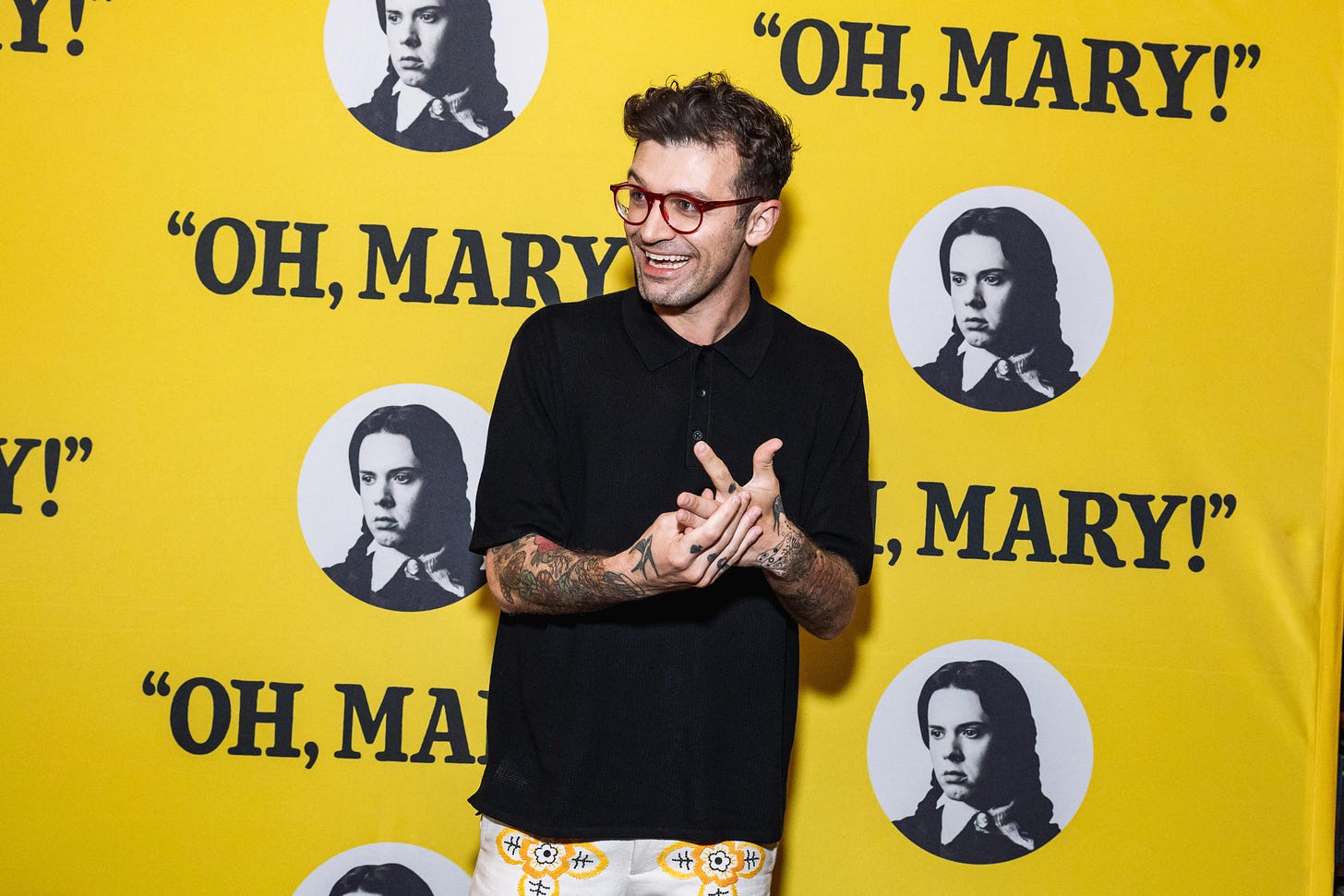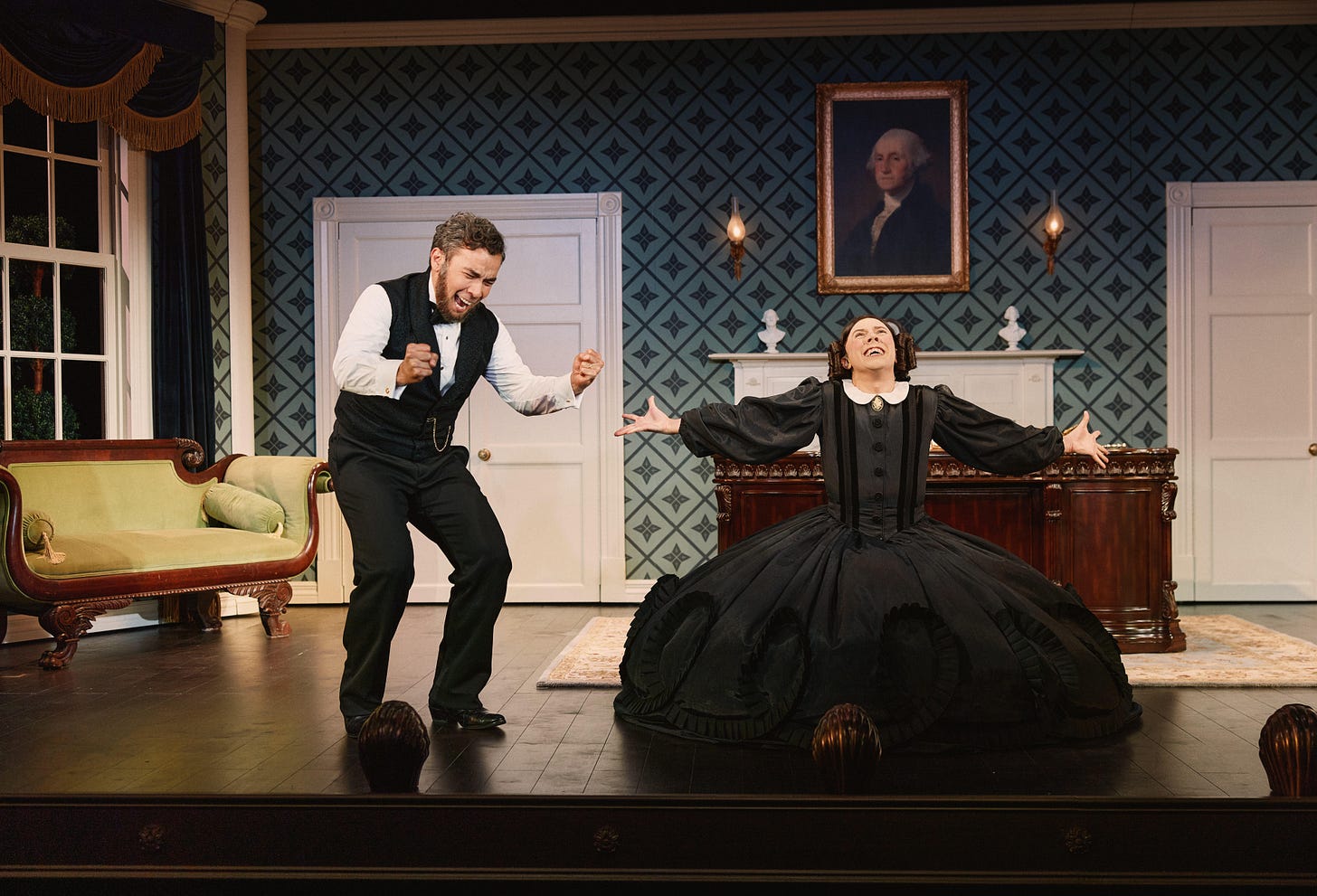How a willfully inaccurate play about Mary Todd Lincoln became a cultural sensation
Director Sam Pinkleton discusses the surprise Broadway smash Oh, Mary!
When Sam Pinkleton first started working on Oh, Mary!, he had little idea the campy play, which reimagines Mary Todd Lincoln as a messy boozehound and wannabe cabaret star married to a gay man, would become the biggest surprise hit on Broadway in years. Or that it would make it to Broadway at all.
“We were only supposed to run for eight weeks for our gay friends, if we were lucky,” the director and choreographer recalled recently over Zoom.
Written by Cole Escola, who also originated the role of Mary, the play is set in the fateful final weeks of the Civil War. The first lady is bored out of her mind and frustrated that her husband is too busy being president to give her the attention she desperately craves.
The play, which is blissfully unconcerned with historical accuracy—and, for that matter, good taste. Bawdy, demented, and unapologetically queer in sensibility, Oh, Mary! doesn’t pretend to be saying anything “important” about the world, yet it feels like a revelation because it is so wildly entertaining.
“It’s the only thing I've ever read that made me laugh out loud,” Pinkleton said. “Reading plays is a nightmare. But I read this play and was howling.”
Oh, Mary! earned rave reviews and became an instant sensation when it opened downtown in early 2024. After multiple extensions, it transferred to Broadway’s Lyceum Theatre in July, where it broke box office records. It has turned Escola, a non-binary cult comedian formerly known for scene-stealing turns in shows like At Home With Amy Sedaris and self-produced YouTube specials that were deemed too queer for network TV, into the kind of theater star (and talk show darling) Mary could have only dreamt of being.
On Thursday, the proudly stupid play is likely to score multiple Tony nominations, and to face off against high-minded projects starring Hollywood A-listers, like Good Night, and Good Luck and Othello, in one of the most competitive Broadway seasons in years.
It’s been quite an unexpected journey for “a dinky little play with a shitty cardboard set,” Pinkleton said.
Despite Escola’s singular performance, Oh, Mary! has also proven to be a surprisingly durable showcase for actors from different backgrounds: In January, GLOW star Betty Gilpin stepped in to play Mary for eight weeks. She was followed by Tituss Burgess, of Unbreakable Kimmy Schmidt fame, who donned the bratty curls for a three-week engagement before Escola returned in April. Instead of turning off audiences, the revolving cast has only driven more intrigue toward the play—due to the exciting new shades each actor has brought to the part.
Pinkleton, whose background is in choreography, helped shepherd the play through these various incarnations, and hopes to see the role of Mary embraced by community theater divas around the country.
While it’s tempting to draw parallels between this story about a miserable, self-absorbed first lady trapped in a loveless marriage, Oh, Mary! is something you should see if you want a reprieve from our current nightmare—not if you’re looking for commentary on it.
“I devour pop culture. Part of what I love about being a theater-maker is that I make entertainment, and that’s not a dirty word,” Pinkleton said. “I can get in hot shit with colleagues who disagree because they think our job is to make excruciating art about issues.”
Pinkleton spoke to The Contrarian about the unlikely success and surprising evolution of Oh, Mary! (This conversation has been edited and condensed for clarity.)
Did any part of you expect that Oh, Mary! would become such a hit?
What the process feels like is often an indication of how the thing will be received. It was joyous and easy. There were moments in the making of it where we looked at each other and were like, “I think it might be good?” But to me, there’s a difference between ‘I think it might be good,’ or ‘I think we won't be humiliated,’ and ‘It’s going to be a hit.’ Nobody knows how to make a hit. If they did, everything would be a hit.
Cole always jokes with me, because I made us move the schedule for this show so that I could do a big fancy show, because Oh, Mary! was just our passion project that wasn't going to be a big fancy show. And of course, it has become like the Tyrannosaurus Rex of shows. Every step of it has genuinely been a surprise to me. I didn’t plan to be doing this show a year and a half later. It has been a destruction to my schedule. But it’s an awesome kind of destruction
The play is not attempting to be historically accurate or say anything about the real Mary Todd Lincoln, yet clearly something about this character is resonating with audiences. Why do you think that is?
I can’t speak as an authority on anything that actually happened to Mary Todd Lincoln. I think we had one photograph of her in the rehearsal room, and even that started to feel a little yucky, like she was watching us poop. But I think that Mary Todd, as rendered by Cole and the play, is an extremely relatable human. I love her and feel connected to her delusion, ambition, fear of failure, and longing. In a way, the play is very old-fashioned. She has a real arc. She transforms. We root for her.
I'm obsessed with roller coasters—like, I’m a super-duper roller coaster nerd. When we started previews for the play downtown, we were packed into this tiny room, and people were having this outrageous reaction. I remember very clearly, after the third preview, telling one of the producers, “It feels like Six Flags in here.” It didn’t feel like laughing at a play. It felt like screaming on a ride. I don’t know what the appeal of Mary Todd Lincoln, the historical figure, is at all. But I do think that sensation is an undervalued experience in the theater.
It is so rare these days that we can watch something that’s just silly and funny. It feels almost cathartic.
When I describe it to people who haven't seen it, they're like, “Oh, it’s like a political satire?” I’m like, “Noooo!” We are walking through the world with enough political satire being thrown at us. I actually just hope it's a good time. The jokes in it predate our current political dystopia. It’s pee-pee, poo-poo. It’s things that we just laugh at as animals.
Tell me about the decision to cast different Marys and how the character has evolved with each new performer.
When we were first making it, it was like, “This is a play that will only exist in this time, played by Cole.” Then we watched the play become something else, which meant it was going to live for longer than we anticipated. We started to wonder, “Could other people play Mary?” And in unison, we got excited about that.
I started to think about my mother-in-law, who is a community theater legend in Indiana, and wondered what would happen if she did this at her community theater, and I could really see it.
Every community theater has that wacky, genius actress who plays small parts and steals the show. This is a play for that actress to carry. Cole and I both just love actresses, and I say “actress” as a non-gendered term. I would say Tituss, Betty, and Cole are all extraordinary actresses. So it became really fun for us to start imagining the play in the hands of surprising, gutsy, hilarious people. We talked about all sorts of people, from nineteen-year-old drag queens to literal Meryl Streep, neither of whom would have had any interest.
When Betty Gilpin came up, we were like, “Obviously, it’s Betty Gilpin.” Betty is one part Shirley Temple, one part Katharine Hepburn, and just a creature from outer space. Getting to make it with Tituss was a completely different experience, but still just as deranged. I watched Tituss yesterday and I was so deeply moved. It’s a rock solid play, and a rock solid part.
I hope that it continues to be played by people who have no resemblance to other people who have done it. Mary, as rendered in our production, is this great misunderstood genius. And that describes literally all of my favorite performers ever.
There is something cool about this part going to people from completely different backgrounds: a non-binary actor, a straight white woman, a gay Black man.
Somebody asked me, “What are you proud of?: And I was like, “I'm proud to be giving jobs to weirdos.” It’s not messaging. It’s just cool. We have this opportunity to get people in a building to do the thing they do brilliantly in front of 900 people a night. Let’s take full advantage of that.
It’s especially exciting if it’s an opportunity to see somebody do something they've never done before. Betty always says that she gets cast as the mom with crossed arms on TV. But she came into this show and it’s like she showed up at your dinner party with her own set of knives, laid all of her knives out on the counter, and used every single one of them. I take that responsibility seriously, and that goes way beyond any kind of identity markers.
Of course, I always want the show to be populated by queer people, people who aren't white, people of different ages and body types and experiences. Let’s make it a throbbing magnetic orb for idiot, clown wonders. That might mean that Channing Tatum isn't going to be in it, and that’s okay. Actually, Channing is a really bad example, because I'm obsessed with him. He is so queer-coded.
Have you gotten any angry emails from Mary Todd Lincoln enthusiasts? Or pushback from people who don’t get the joke?
My grandmother, who's still with us, and in her 90s, is a historian. She is deep in Civil War tourism in the South—that is a crazy sentence—and when I told her I was working on a play about Mary Todd Lincoln, she said, and I quote, “Yuck. Why would you make a play about Mary Todd Lincoln? She was the worst first lady.” That’s the most blowback I've gotten [about] Mary Todd Lincoln, and it was just hatred for her.
That being said, the Mary Todd Lincoln House in Kentucky, which is clearly run by angels, has been so kind. They sent us merch, and they tag us on social media. There are a few things I love more than volunteers at a niche historical site. I think the docents at the Mary Todd Lincoln House are in on the joke.
We can find angry people on the internet all day. I’m sure there’s plenty of people who hate everything about the play, bless them, but I’m sure it’s more than just Mary Todd Lincoln enthusiasts who hate it.
Historical accuracy was not a concern for you when making the play. But how do you as a director ensure that it feels emotionally true?
A big reason why the play works is because it's 110% commitment from everyone—and I mean everyone—even the person who painted the idiotic fake books on the shelf. I think there’s a version of the play where we’re winking and patting ourselves on the back, and that would, to me, get exhausting after five minutes. That’s just watching an SNL sketch that’s gone on for way too long.
There is real heart in the play. There’s real heart in the character. It is a cliché that great comedy comes from great truth, but it's a cliché for a reason. We talked a ton about playing it straight. It’s such a high-stakes story. It is about a woman in crisis and a guy with a really hard, stressful job at a spooky time in America, and we take that shit seriously. And that’s what makes it so fun.
Meredith Blake is the Culture Columnist for The Contrarian









Saw the show last weekend. What a treat. Worth every penny. So happy for this hard-working troupe and the visionary rebel at its helm. It's like watching someone win the lottery; that someone's name is Cole Escola. He doesn't have to work another day in his life if he doesn't want to. I just hope he doesn't get bored or feel typecast or allow life-changing success to change him. I want to believe he can cope and continue to strive and conquer new worlds. This country needs a good laugh so badly -- have you noticed? Find it at the Lyceum any day of the week.
Great write up and interview. Makes me really wish I could see it!